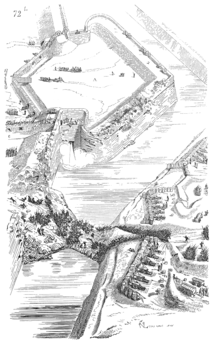breach
A breach is a gap that is torn by attackers in a castle or fortress wall in order to allow an assault. The name came up at the beginning of the 17th century and was derived from the French word "brèche", which in turn was borrowed from the old Franconian word "breka" for "break".
In medieval fortifications (castle or city walls ), breaches were prepared with the help of underground tunnels ( saps ), which hollowed out the foundation of the walls at one point and could then be brought to collapse with the help of siege equipment.
With the introduction of gunpowder in the 14th century, the effectiveness of such undermining was increased by detonating explosives under the walls. In addition, guns were developed in the 15th century that had enough firepower to collapse masonry effortlessly from a distance. As a result, the height of the wall was reduced, its strength increased and the walls were equipped with protruding bastions , which made it difficult to break a breach. The bastions were laboriously approached with entrenchment work in order to bring them under gunfire from a short distance and thus create a breach. In the early modern period it became generally accepted in Europe that the defenders of a fortress were advised to surrender after the first breach had been made. If this refused, the besiegers no longer felt obliged to spare the besieged after storming the fortress. Storming a breach was usually a dangerous undertaking. The defenders often formed a dense infantry formation behind the breach and held materials such as wood and earth ready to temporarily close an opening in the wall. In addition, the attackers could be shot at from adjacent bastions. An attack on a breach was very costly for the attackers, as they were not only expected by the defenders with prepared firing positions, but were also slowed down and pushed together by the steep incline. Because of this high risk, a volunteer suicide mission was sent ahead.
The word breach is only used in a figurative sense in today's warfare, for example as another name for “breakthrough”. The word is also used literally, for example when you “step into the breach for someone” (i.e. supporting someone by defending him / her and / or taking on (parts of) his / her duties).
